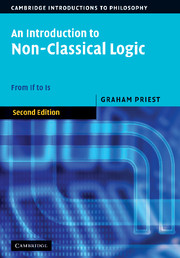Book contents
- Frontmatter
- Contents
- Preface to the First Edition
- Preface to the Second Edition
- Mathematical Prolegomenon
- Part I Propositional Logic
- Part II Quantification and Identity
- 12 Classical First-order Logic
- 13 Free Logics
- 14 Constant Domain Modal Logics
- 15 Variable Domain Modal Logics
- 16 Necessary Identity in Modal Logic
- 17 Contingent Identity in Modal Logic
- 18 Non-normal Modal Logics
- 19 Conditional Logics
- 20 Intuitionist Logic
- 21 Many-valued Logics
- 22 First Degree Entailment
- 23 Logics with Gaps, Gluts and Worlds
- 24 Relevant Logics
- 25 Fuzzy Logics
- Postscript: A Methodological Coda
- References
- Index of Names
- Index of Subjects
13 - Free Logics
Published online by Cambridge University Press: 05 June 2012
- Frontmatter
- Contents
- Preface to the First Edition
- Preface to the Second Edition
- Mathematical Prolegomenon
- Part I Propositional Logic
- Part II Quantification and Identity
- 12 Classical First-order Logic
- 13 Free Logics
- 14 Constant Domain Modal Logics
- 15 Variable Domain Modal Logics
- 16 Necessary Identity in Modal Logic
- 17 Contingent Identity in Modal Logic
- 18 Non-normal Modal Logics
- 19 Conditional Logics
- 20 Intuitionist Logic
- 21 Many-valued Logics
- 22 First Degree Entailment
- 23 Logics with Gaps, Gluts and Worlds
- 24 Relevant Logics
- 25 Fuzzy Logics
- Postscript: A Methodological Coda
- References
- Index of Names
- Index of Subjects
Summary
Introduction
13.1.1 The family of free logics is a family of systems of logic that dispense with a number of the existential assumptions of classical logic.
13.1.2 In this chapter, we will look at the semantics of, and tableau systems for, various free logics.
13.1.3 We will then discuss how these logics handle some issues concerning existence.
13.1.4 Until further notice, we assume that the language does not contain the identity predicate. In the final part of the chapter, we will see how its addition affects matters.
Syntax and Semantics
13.2.1 The vocabulary of free logic is the same as that of classical first-order logic, except that we single out one of the one-place predicates for special treatment. Let this be. We will write this as, and think of it as an existence predicate. Thus, a can be thought of as ‘a exists’.
13.2.2 An interpretation for the language is a triple 〈D, E, ν〉, where D is a non-empty set, and E (the ‘inner domain’) is a (possibly empty) subset of D. One can think of D as the set of all objects, and E as the set of all existent objects. Thus, one might think of D as containing objects such as Sherlock Holmes, Pegasus and Julius Caesar. Only the last of these would be in E.
13.2.3 As in classical logic, ν assigns every constant in the language a member of D, and every n-place predicate a subset of Dn.
Information
- Type
- Chapter
- Information
- An Introduction to Non-Classical LogicFrom If to Is, pp. 290 - 307Publisher: Cambridge University PressPrint publication year: 2008
